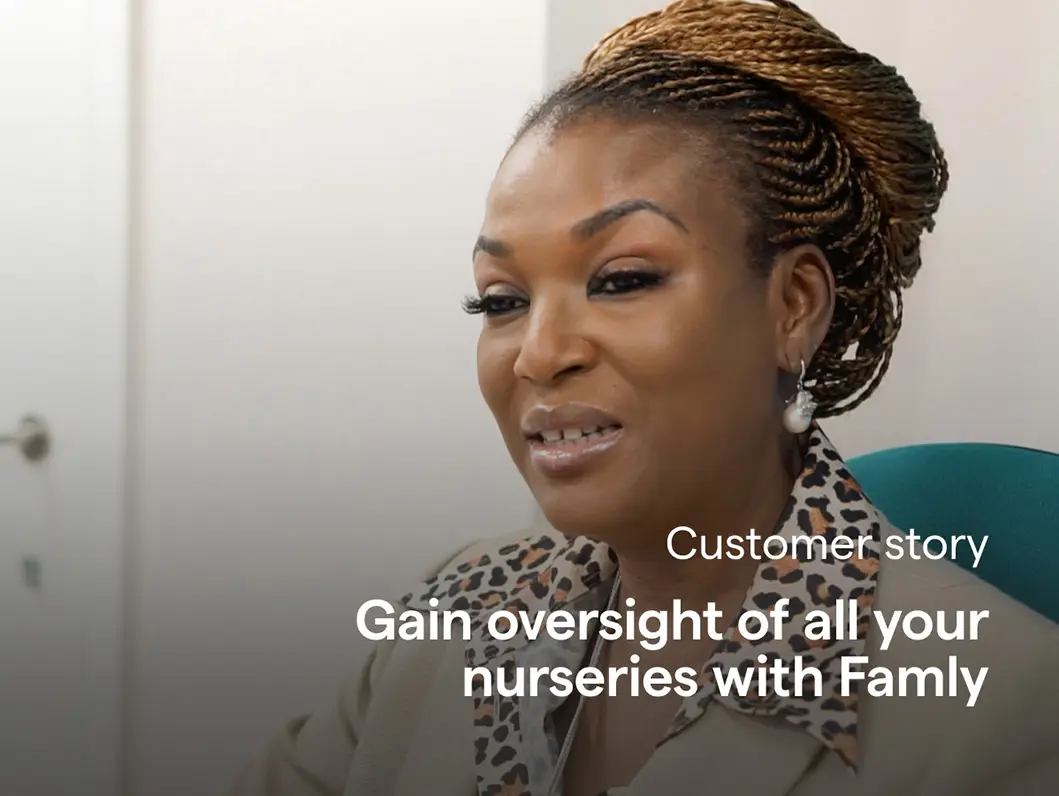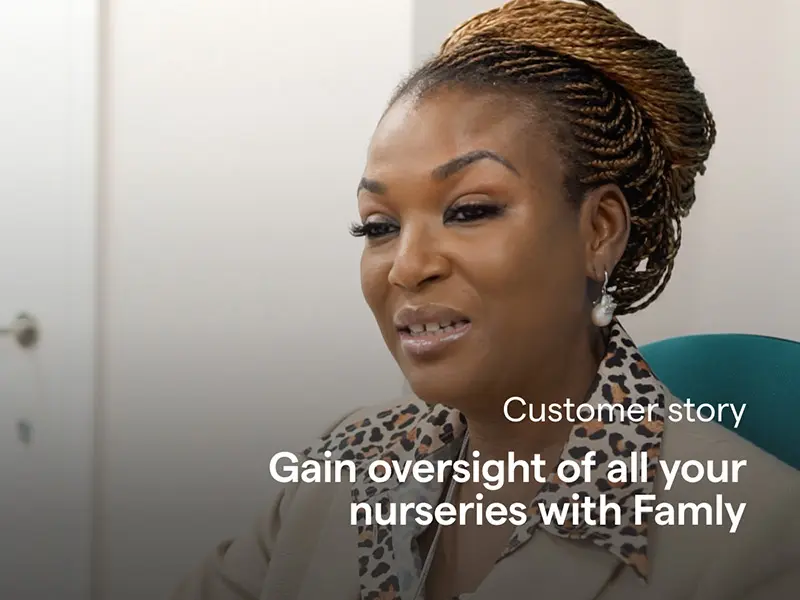settings
children
With Famly since
Picture someone working in the Early Years.
What do they look like?
If you pictured a woman, you’re probably not alone. The early education workforce is predominantly female, with group-based and school-based Early Education and care providers reporting that 97% of paid staff are female. Globally, men make up a tiny percentage of people working in early education.
But parents are overwhelmingly in favour of male practitioners, and the sector is actively looking to recruit more men. So what’s going wrong?
I sat down with Jermaine Payne, a nursery manager in London, to find out what it’s like to be a man in the Early Years and how we can encourage more men into the sector.
Why do we need more men in early childhood education?

“We don’t have to feel that it’s a female-dominated field. There are lots of opportunities for men in the sector and a lot of benefits. We need to normalise, from a young age, that men can be caregivers.”
Jermaine Payne
The big ideas
Men in early education demonstrate to children early on that caregiving doesn’t have a gender.
“Often, when children grow up in lone-parents families, it’s with the mother,” explains Jermaine, “So from a young age children see the caregiver role as one that’s for women.”
When it comes to challenging the stereotypical view of gendered jobs and roles, the earlier, the better.
Research from The Fatherhood Institute and Lancaster University found children receive career guidance very late in their education and learning. By their mid-teens, (and probably earlier), children have established ‘clear ideas around gender and career pathways’.
This means that young men often simply don’t recognize that being an early childhood educator or staff member is even a career option.
But Jermaine and other men are helping to change that. Having now been in the sector for 18 years, the children Jermaine looked after as toddlers are now old enough to consider entering the sector themselves.“I see them in my local area,” says Jermaine, “They remember me and I still talk to them. It shows those boys, who are now developing into young men, that men can do it. The person who looked after them in their Early Years is a man.”
All rough ’n’ tumble and risky play?
Challenging the seemingly ‘positive’ gender-based stereotypes is also essential for men to thrive as practitioners too.
The tendency is to assume that we need more male practitioners because they’re good at physical and risky play, or can fill in for absent fathers. But these stereotypes can also be harmful, by placing extra stress or responsibilities on male educators.
“Male practitioners must manage the expectations of parents, colleagues and children in terms of offering something ‘special’, novel, or interesting, and being a good, responsible, and trustworthy practitioner. In addition to this, they must be skilful and trained in managing physical play with children. As this area of learning is perceived as a natural characteristic in men, the need for training on how to engage in physical play with children is sometimes overlooked.”
GenderEYE
“It’s more down to your personality,” explains Jermaine, “I’ve seen women want to be physical and get stuck in. It’s not just a male practitioner thing. Just because we’re men doesn’t mean we have to do the physical stuff and play football. Let’s normalise women doing that too.”
Dr Jeremy Davies from MITEY (Men in the The Early Years) points out, these arguments suggest that men are just better at certain things — as if there’s some special secret to playing in the mud that only a man could know. They are not compatible with making the sector more diverse as a whole. If we’re pushing for gender equality in the Early Years workforce, fixating on these ‘practical benefits’ of men probably isn’t too helpful in the long run.
“These arguments put unreasonable demands on male practitioners because they assume that all men fit into some idealized model of masculinity. But if that’s our focus, where does it leave the female practitioners?” Jeremy asks. “That risks bringing us back to square one in some way, where children see their male and female practitioners doing these stereotypically gendered activities.”
What’s more, We would never debate the ‘practical benefits’ to hiring a disabled practitioner, a Black practitioner, or anyone else. In those cases, we just understand that diversity is, in itself, a worthwhile cause. It’s about making sure every child grows up in an environment that reflects their own background, culture and identity. That’s just too important to condense into a concrete benefit or a statistic.
So why treat the gender equality effort as a separate thing?
“When you encounter an Early Years group that’s good at gender in the workforce, you can bet they’re good at gender, full stop — and good at all forms of diversity and inclusion,” Jeremy says.

Being a man in early childhood education

“I was always the only man in the settings I worked at. I think I’ve maybe worked with five men in total, in all the time I’ve been in Early Years. I’ve been in the sector for 18 years now.”
Jermaine Payne
Jermaine was only 16 when he entered the sector through an introduction to childcare course, offered by his local authority. He’d initially wanted to be a sports coach but all the places on that course were taken. So he opted to learn about childcare instead.
“I thought, ‘That’s fine, I can work with children, no problem,’” laughs Jermaine, “But I’ll never forget the first time I walked into a nursery! It was so different from what I expected.”
But aside from getting used to the noise, mess, and of course, the nappy changes, being the only man all the time was tough.
“It was difficult for me because I always knew there was a stigma around being a man in the Early Years.” says Jermaine “We’re talking the early 2000s, and I knew there was a potential for people to make comments or accusations.”
And Jermaine wasn’t alone in his concerns. More than half of male practitioners reported that they have contemplated leaving the profession due to concerns around allegations of sexual abuse (compared to 6% of women).
Luckily for the children in his care, Jermaine’s love of the role keeps him in the sector. Through his hard work and commitment, Jermaine earned a leadership position within 8 years of starting his introductory course and has now been in management 8 more years.
“I’m passionate about child development.” says Jermaine, “I love to make those attachments, those bonds with children. You’re making a change to a child’s life. Giving them experiences they might not have. That’s our job and that’s what matters. I love helping families.”
And Jermaine feels things are improving.
“There’s more awareness now and people are more inclusive,” says Jermaine.
Why are there so few men in early education?
While this is far from an exhaustive list, let’s touch on some of the biggest reasons why we’re missing men in the Early Years:
- We’re still dealing with the sexist idea that caring for children is women’s work. Unfortunately, this outdated notion still lives on in the corners of many people’s brains. And it shapes everything from politicians’ prioritization of the sector, to parents’ feelings about male practitioners, to young mens’ ideas of which careers are for them.
- The issue doesn’t get enough funding or attention from the government. “If you’re a government minister, the first thing you’re bothered about is whether there are enough nurseries, how many children go through them, are the staff qualified, and so on,” Jeremy says. “And yes, if you’ve thought about it, you might want to get some more men in there. But it just has never been that big a priority.”
- Some parents aren’t comfortable with men working in childcare. In one 2018 study, 79% of surveyed parents wanted to challenge the gender stereotypes confronting their young children. But in Jeremy’s experience, nearly every male educator he’s spoken with has experienced parents objecting to their presence. He says this points to a bigger need for practitioners and parents discussing this issue together.
But regardless of the cause, Dr Jeremy Davies from MITEY (Men in the The Early Years) says one thing’s for certain: Change needs to come from within the sector.
“Most everybody gets that gender equality is a good thing, but there’s a difference between understanding that, and actively engaging in changing things,” he says.
The good news is, making a difference is probably easier than you think.
How do we support and encourage men into early education?
“To start with, I didn’t know much about child development or care. I thought it might not be for me,” says Jermaine, “But the feedback I got from my colleagues was that I was really good with the children, that my interactions were good. So I thought, I can do this! I’ll give it a shot.”
This support and encouragement led Jermaine to not only complete the introductory course he’d started, but earn his levels 2 and 3 as well.However, it wasn’t all plain sailing for Jermaine.
“I started to realize that being a man in the Early Years could present some problems,” he explains. “I’ve had parents point-blank refuse to have me as their child’s key-person, because they didn't want me to change nappies. I’ve been through it all.”
Supportive management
But Jermaine’s manager at the time was fully supportive of him and backed him up completely, which is key to retaining male practitioners. The manager informed the parents that Jermaine would be their key person should their child join, and if that wasn’t for them, they could find another center
Take some extra time to support and listen to your male educators. While we’re talking about gender stereotypes, some men might have learned to bottle up their frustrations or worries — so it’s worth asking them directly how you can help them feel most welcome and supported on your team. Really this goes for both male and female staff. Within the UK, you can also connect with local support groups through MITEY.
Believing in yourself
Aside from having a supportive team around you, Jermaine says that male educators must also have faith in themselves.
“I knew I had skills I could have taken elsewhere and found another career.” says Jermaine, “But I’m persistent and strong-minded. I could see that being in a nursery, I had an impact on children, on their lives. I had attachments with children and I couldn’t let that go. So, I do what I do best and block out all the unnecessary noise.”
Use gender-inclusive language
Be mindful of the language you use in your hiring advertisements. ‘Early years practitioner ' or ‘early educator’ are great choices for job titles, as they’re professional and gender-neutral.
Avoid terms like 'nursery nurse' as, although many men are nurses, it could be excluding men from applying. When you’re describing your ideal candidate, keep in mind that some of our go-to adjectives might be considered ‘feminine,’ which could put off a potential male applicant.
Increasing visibility of male educators
Jermaine believes that men in the Early Years should be more visible, perhaps taking workshops in schools and colleges, and being present on social media, to create awareness. Research shows that boys ‘receive very little exposure to early years as a career’, so greater visibility would certainly help.
This includes making men more visible on your marketing materials. When you’re drawing up promotional flyers or building your website, it’s worth thinking about how those reflect gender diversity. Male apprentices and educators will be more drawn to you if they can already ‘see themselves’ on your team.
“Men in the Early Years need to make a stand,” says Jermaine, “We need to get out there and create awareness of why men being in the Early Years is good!”
In fact, Jermaine himself has considered consulting or coaching in the future, to support more men into the Early Years. Watch this space!
Learning from other countries with more male early childhood educators
Norway managed to increase the amount of men working in their Early Years sector five-fold. And, although still only 9 percent are men, this makes Norway’s the most gender-diverse Early Years sector in the world. So how did they do it?
- Positive action strategies – like inviting male applicants for an interview even if they are not a perfect fit for the job ‘on paper’,
- Inviting specifically men to open days and making clear in adverts that men are welcome to apply
- Suggesting early childhood education as a career for boys and men at school and in job centres
- Promoting early childhood education vacancies directly to men or specifically to inspire potential male recruits
You can read more about these efforts through GenderEYE and NIKK Nordic information on gender.
Further reading:
Top tips from Alphabet House
Get top tips from a setting just like yours. Hear from Alphabet House on why and how they use Famly - and why they’ve never looked back.
Read their story








%20your%20early%20years%20team_1200x900.webp)

